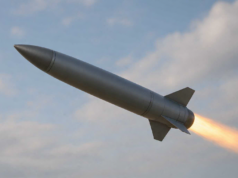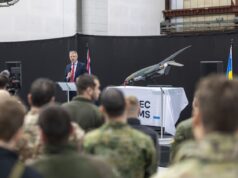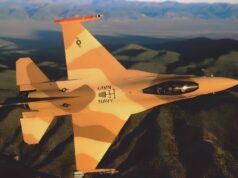The UK could face the possibility of a war with Russia within the next five years if it does not urgently replenish its stockpiles of weapons and boost its defences, according to former head of the British Army, General Sir Patrick Sanders.
Speaking on the Money Maze podcast, Sir Patrick, who stepped down as Chief of the General Staff in June, spoke on the need for the UK to rebuild its military supplies, which have been significantly depleted due to support provided to Ukraine.
“If we don’t regrow what are very, very empty stockpiles at the moment and recapitalise, then we risk making conflict an inevitability,” Sir Patrick cautioned. Sir Patrick also expressed concern over the UK’s capacity to defend itself against aerial attacks, describing the nation’s current defensive capabilities as “weak.” He highlighted the importance of restocking missile supplies to ensure the UK can respond effectively in the event of an unlikely aerial assault.
During the podcast, Sir Patrick also noted that the UK’s military is currently “historically very small,” and stressed the need to rapidly increase troop numbers to address the growing threats of global power conflicts. He warned that rebuilding the Army’s strength to an adequate level could take five to ten years.
Looking ahead, Sir Patrick pointed to potential emerging threats from other global powers, specifically mentioning the possibility of a simultaneous threat from Russia and China by the late 2020s. He suggested that the best way to avoid such conflicts is by ensuring the UK is “ready to fight, able to deter, and prevent these conflicts from happening in this decade.”
Earlier in the year, we reported that the Ministry of Defence (MoD) has announced a comprehensive framework for missile defence research and development, titled Science and Technology Oriented Research and Development in Missile Defence (STORM).
The contract will manage the delivery of research covering all activities to counter ballistic missiles and advanced threats, including but not limited to simple non-separating threats, complex separating threats, Manoeuvring Re-Entry Vehicles (MaRVs), Multiple Independently Targetable Re-Entry Vehicles (MIRVs), Hypersonic Glide Vehicles (HGVs), Hypersonic Cruise Missiles (HCM), and hybrid threats.
The research required will cover analysis, experimentation, trials, and technology/system development across all pillars of missile defence:
- Counter-proliferation: Measures to minimise the spread of missile technology.
- Deterrence: Measures to discourage the use of missile threats.
- Counterforce: Actions to reduce the quantity of missiles and supporting equipment available to an aggressor during a conflict.
- Active defence: Strategies to detect, track, intercept, and disable or destroy missiles in flight.
- Passive defence: Measures to mitigate and recover from the effects of missile impacts.
The STORM framework, with an estimated budget of £110 million to £251 million, addresses a broad spectrum of missile defence activities. According to the MoD, the contract will “manage delivery of research covering all activities to counter ballistic missiles and advanced threats including but not limited to simple non-separating threats, complex separating threats, Manoeuvring Re-Entry Vehicles (MaRVs) and Multiple Independently Targetable Re-Entry Vehicles (MIRVs), Hypersonic Glide Vehicles (HGVs), Hypersonic Cruise Missiles (HCM) and hybrid threats which share characteristics with BM, HGV and/or HCM.â€
The MoD outlines the historical and ongoing challenges posed by ballistic missiles: “Since the first V2 attack on London in 1944, ballistic missiles have posed a near constant threat to the UK, its overseas interests, and forces. Adversaries continue to invest in and proliferate increasingly advanced ballistic and manoeuvrable threat systems to challenge our freedom of action.â€
The MoD specifies the pillars of missile defence research under the STORM framework as follows:
- “Counter-Proliferation: Measures to minimise the spread of missile technology.â€
- “Deterrence: Measures to discourage the use of missile threats.â€
- “Counterforce: Actions to reduce the quantity of missiles and supporting equipment available to an aggressor during a conflict.â€
- “Active Defence: Strategies to detect, track, intercept, and disable or destroy missiles in flight.â€
- “Passive Defence: Measures to mitigate and recover from the effects of missile impacts.â€
The UK Missile Defence Centre (MDC), a unique government-industry partnership within the MoD Head Office, will spearhead the STORM framework. The MDC is responsible for all UK missile defence Research & Development (R&D) and provides support to decision-makers on all aspects of missile defence. The MDC was established to “provide a pipeline of funding to sustain SQEP (Suitably Qualified and Experienced Personnel) in relevant UK industry sectors.â€
The MoD highlights the strategic importance of the STORM framework: “The Missile Defence R&D Category Strategy, approved in May 2023, recommended creation of a new route to market bringing together core research and technology maturation projects into a single contract, enhancing research outcomes and supply chain efficiency.â€
The selected contractor will work closely with the MDC to “design and manage a contract pipeline to deliver the Missile Defence R&D category’s research requirements.â€Â This includes large, multi-year research technology maturation projects, multinational and multi-supplier trials, and short-term rapid analysis. The coordination function is envisaged to be co-located with the Missile Defence Centre in Farnborough.
The notice further details that “the research required will cover analysis, experimentation, trials and technology/system development across all pillars of missile defence.â€
The STORM framework is part of the 2020 MOD Science & Technology (S&T) Strategy, which aims to “sustain, exploit, and develop UK industrial and academic expertise to continue to develop next-generation and generation-after-next technologies applicable to Integrated Air and Missile Defence.â€













Essentially extending the framework that lead to CAMM and some other good things with UK IP.
We gave a highly competent ability to design and assemble excellent missiles even though some bits are nominally foreign owned.
We are in a good place with lots of exports for those systems.
Good Afternoon,
Another confirmation as regards how small and weak our forces are.
How on earth was it allowed to get in to such a state? There does have to be at the end of the day some accountability.
However for the moment the most important thing is a rapid investment in investing in new Defence equipment and in increasing personnel.
In future all parties should agree to a minimum GDP to be spent to ensure our forces are properly supported in peace and war.
Have we forgotten the Chamberlain days before the 2nd World War?
We do not seem to learn from the past at all!
It’s time to change that and ensure. Our forces are strong enough to counter any threat.
Best regards from Hamburg Germany
Agreed ðŸ‘
You are referring to 90 years ago so not that much to learn from it. To be fair to Chamberlain, who is often maligned, he tried to avoid a catastrophic war and when it was clear it could not be avoided, he declared war. A war was indeed foreseen and prepped many years earlier and serious and urgent rearming started in Britain from 1934, years before Chamberlain was even prime minister. In that 5 years before Britain created a new generation of advanced fighters, which won us the Battle of Britain, a revamped Navy with new battleships and carriers ordered and a whole new set of tanks for mobilised expeditionary infantry. So there was no blindness to potential war as you indicate at all, this is proven when war started because British industries were outperforming Germany in equipment replacement. you are conflating political manoeuvring to respond to unexpected aggressive actions by Hitler with underfunding and lack of foresight. The problem now is very different and the issues that have led to where we are now, is also for many different reasons.
Chamberlain as firstly Chancellor and then as PM, was instrumental in rearming Britain, especially the RAF. He set the groundwork for success in fighting the Battle of Britain.
Yes absolutely, that’s what I made the comment to Nick Paton. Britain was seriously rearming from 1934, way before that piece of paper. If Britain had dogmatically kept the same military spending levels from 1919 to 1932, then we would have had legions of obsolete bi planes and ships and antiquated tanks, the rearming was a relook and new approach and we ended up with the only Airforce in the world at that time, capable of beating the Luftwaffe. We also laid plans for new carriers and other innovations in this so called period of appeasement. Chamberlain was no dumb ass and no war monger either.
Chamberlain as Chancellor fought a desperate rearguard action against rearmament spending when it was clearly desired by the public.
As Prime Minister he ensured that the Continental Committment was only fourth in the list of priorities for defence spending whilst the lauded and rewarded RAF pissed away their lions share of the budget building a force of crappy useless bombers in a half-baked theory of deterrence.
Chamberlain changed. He was detrimental to war effort and later supported it.
but he was too late to have a dissuasion effect on Hitler.
The issue is that UK was not as fast as necessary following German developments that were shown in Spanish Civil War.
Absolutely spot on.
Post-1991 amnesia, I think once the old Cold War ended our politicians were complacent in thinking the threat of war in Europe was gone.
Fair enough new enemies came into focus, namely Islamist militias, and we shaped our military for COIN and totally discarded any preparation for near-peer conflicts.
For observant people, there were signs as far back as 2008 that Putin was gearing up for conflict, creating new generation ballistic and hyper-sonic missiles, buying up gold reserves, and decoupling Russia’s economy from the dollar.
Politicians of the day chose to ignore those signs, and here we are, panicking about lack of capability, lack of force numbers, glacial procurement of arms, and lack of scaled-up industry that is needed to endure attritional conflict.
Good Day!
I did not suggest it should be ring fenced! The amount we pay for Defence should be adapted and supported for what our forces require! 3,5-5,5% If we really want to improve things!
Regards Nick
Ps it also interesting to hear old sea Lords and Chiefs of staff coming out with such remarks after they have retired.
Gen Sanders was always very critical about Britain’s slender defences when CGS. Some say his repeated outspoken comments were the reason he was only in post for 2 years and also was not considered for the CDS post.
Interestingly chamberlain as Priminister was pushing the hell out of rearmament at the same time as using appeasement…appeasement was linked to rearmament..it was chamberlain as chancellor who helped remove the 10 year rule in 1932….chamberlain always new war was likely, appeasement used for time…
if your going to us the pre war years of WW2 our defence spending looks like we are just coming out of the 10 year rule….unfortunately from a geopolitical risk piont of view it’s 1938/39 not 1931…..
what I don’t believe in is a min GDP spend..that’s an arbitrary figure that changes each year depending on how well the economy is doing….what is needed is for the minimum force levels and readiness to be set and adhered to, with funding allocated to maintain those levels
Thanks your comments,
The most important thing is now. We need to rearm and build up our forces soonest.
Nick Hamburg Germany
Another one who only speaks out once his pension is secured.
You do understand he took an EARLY pension because he spoke his mind in office, right?
One of the very few that did and all kudos to him for doing that. The sad reality is that many Ex Chiefs or Heads of the Army didn’t and that’s part of the reason we are where we are. I think that what was the point Bob was making.
Then I withdraw my remark.
Agreed he Spoke up other always wait till retirement .
Seems I misspoke here and am happy to withdraw my allegation. I wish all senior military would follow his example and that government’s of either colour would listen instead of punishing.
Kudos to you for listening and learning.
If everyone in here was as rational…..
👠Good on you, Bob.
On your wider point, you’re right. The Chiefs of Staff are usually long retired before moaning, pension safe, job on the board of some MIC company.
Seems General Sanders was not one of them.
One of our posters, Graham, worked with him and vouched for his ability and popularity.
Rubbish. Sanders was constantly critical of Britain’s small armed forces and also of giving away kit to Ukraine without replacing it promptly, all the time whilst in office. Many say his career was effectively shut down as a consequence.
.
The Gentleman is right and must of us on this site relies this .GBAD is badly needed ,and troop numbers ammunition must be sorted now never mind waiting for the a better Economy because really it’s just the government saying get round to it ( Excuse ) 😞 🇬🇧
Undoubtably the government will maintain the line of wait until the SDR is complete. Which is utter nonsense, replenishment of small and large calibre weapons , missiles etc does not need an SDR.
The ONLY thing that could effect ammo replacement is if the SDR recommends a more rapid updated of Ch2 to CH3. In which case we can run down Ch2 ammo.
I think the Ukraine has its own ideas about running down the CR2 Ammo stocks, they want to relocate them from inside a warehouse to inside a Russian AFV! TBH as Russia is very depleted right now I can’t see us fighting a major heavy land war any time soon. And the more Russian Tanks they nix the longer that will be.
That may seem a little odd, but it’s reality and it’s a reality Putin should think about long term. Poland is rapidly heading towards having @1500 Modern MBTs, plus everything else they need to wallop Russia.
But replacing other munitions should be a priority.
I am all in favour of the U.K. government accepting Ukraine generous offer of disposing of obsolete weapons for free.
Given that Putin has got Russia on a war footing. It will not take as long as you think for it to replace ammo, shell, tanks, afv etc.
Precisely. We are not being serious about Putin. He seems to be on the ropes but remember the German Army was still fixed at 100,000 in 1933 and yet 7 years later conquered Europe. Germany was notoriously disorganised in manufacturing. Russia has huge natural resources of all strategic war materials and is self sufficient. If still led by people of Putin’s mentality or the monster himself; all of the West needs to be ready in 5 years as the general states.
Virtually all foreign aid needs to go to defence and all the other luxuries reviewed with the population brought on board to be made more defence aware.
Surely the biggest danger at the moment is the cheap drones. We need a method of plucking them harmlessly from the skies before they can do any damage. This is the place where new suppliers might well be able to produce something at the right price
Fear mongering
Reality
Extra £30bn on defence is something that might be true.
Seems touch high to me.
To a certain extent the drones being used are quite basic and any decent EW setup would make them unusable.
Spot on re GBAD from the General. Assume he means both for the Field Army and UK defences.
The damage was done both by Labour 97 to 2010 and the Tories since, so HMG is the blame game, not individual parties.
As for Storm, it’s too much talking and waffle and more millions wasted for me.
Commit x amount to recruiting, say, 500 more RAF Regiment.
Augment with RAuxAFReg as needed.
Identify best system/s now OTS, and look to buy.
Stop the waffle.
It must also be borne in mind that NATO nations stand between us and Russia.
So regards UK GBAD, although there is a vulnerability, and its an area that needs improving, let’s keep things in perspective.
Hi Daniele. Your last paragraph is key for me- it’s a case of cost/risk analysis.
Not saying we don’t need GBAD, we absolutely do. but we need to focus the spend where it’s most likely to be most useful- providing a shield for our forward-deployed troops and airfields. SAMP/T and CAMM/-ER/-MR are, for me, where this should be leading now- rather than in 5 years’ time once STORM has spent most of its money on consultants. None of the systems I mention there will be obsolete in the next 20 years (assuming we keep up with the developments, so we don’t need to talk about it.
It is rather odd as the longer term bits of procurement like ordering Sky Sabre + or A30 land version could be done in parallel with figuring out who to control them.
We probably have enough sensors to combine for a picture. The issues is identifying the gaps where we don’t have overlapping systems and fixing those gaps otherwise they become back doors.
I understand there are indeed gaps, not for detailed discussion here. One obvious indication of this was when we pressured Denmark to re establish the RRH in the Faroe Islands to increase coverage there. Saxa Vord was also reactivated.
What concerns me equally is not so much air attack on these places but ground action. Most of the RRH are static and not easily moved.
The same goes for the NATS radar stations which also feed into the RAP.
To be honest anyone with compass and basic technical knowledge can guess the gaps!
If they couldn’t guess them then they would just fly a light aircraft around with some passive sensors in it.
Sadly not very hard these days.
But I agree pointing towards the issue isn’t cool.
I think the Danes acted in self interest too. They need us quite a lot in a lot of areas.
I was a tiny, tiny part of SDR98 & I remember a MoD high up who wanted the UK to buy THAAD, even back then. Nothing happened other than wasting many millions on endless studies. We should abandon trying to stop high end ICBM. That is what Trident is to deter. The risk is from cruise missiles, suicide drones & basic conventional ballistic missiles. A mix of SAMP-T & SkySabre, backed up by the BAE SAAB 40mm or MSI-Defence Terrahawk Paladin (30mm?) GBAD guns would do. Should not be crazy expensive either. If we keep our order to the minimum credible, rather than a huge fantasy defence screen that gets immediately cancelled for being too expensive.
I remember, you mentioned that THAAD comment before, fascinating.
Where are the suicide drones launched from? A ship? Or already within our borders?
This issue must go beyond mere systems and involve the intelligence services.
These cheap drones are getting more & more range. Granted the biggest threat is Russian submarines & surface ships firing cruise missiles from hundreds of miles from our coast. Perhaps the RAF needs a few more P-8, if money can be found? The ballistic missile threat from Iran churning those out. Ironically with Israeli designs that came via the ANC in South Africa (allegedly). It is quite scary how far simple suicide drones bodged together by Ukraine can fly deep into Russia.
What missile defence ? we have nothing that is land-based and long-range like Patriot or S400
So how would we defend Parliament or Whitehall from something like a submarine-launched cruise missile attack?
We have Sky Sabre, but that is for the Field Army so might be in the field by the time hostilities commence.
No need to defend Parliament in my opinion, though re London
I can think of three buildings in the Whitehall Central Security Zone that would benefit from protection, and one beyond it. One is Main Building.
Assume this is an sub cruise attack from the west.
Would the sub even be in that position?
Has it been tracked by IUSS and other assets?
Would it even be there? Russia seems to have a “bastion” doctrine where their assets remain in the Barents and Kara seas, lobbing missiles and defending the waters their SSBN are likely to be in.
Also, is this a surprise attack or a clear build up before hostilities? All subs and surface vessels leaving North Cape are tracked, and the idea is hostiles are engaged “up threat” so in Russia’s backyard as much as possible by other NATO assets, not just ours.
If hostilities were considered imminent would it even try if it new NATO ASW was waiting for it?
I think the reality is that it needs to be a small surprise attack, so that even if a submarine gets missiles off, they’re the only ones it fires before NATO negates it.
Which is why I suggested that although I agree we need something, as we are pretty naked, we are hardly undefended and by an accident of geography NATO nations stand in front of us.
Range is increasing. Russia could fire from Kaliningrad or not far into the Baltic from St Petersberg. They would not have to go far round North Cape to hit bases in Scotland. Then the fear of simple Iranian drones smuggled into rural France, that could gently chug their way to an unprepared England. Eire refusal to spend on defence means a Russian sub could sit safely off Eire’s Atlantic coast & fire cruise missiles over Ireland to hit Liverpool or Manchester.
Quite right. Why isn’t the RAF taking the lead on this? I dont blame them or the other Defence chiefs. They should collectively offer to resign at this point in proceedings.
The Politicians are failing us.
Sky Sabre is more point defence, I was thinking something more long range with some ABM ability like Patriot or Arrow 3.
Patriot is around $800m a battery & in high demand from Ukraine & existing users. Might be easier to get SAMP-T NG, as it is similar in capability & cost to Patriot. France & Italy have just ordered more SAMP-T NG, so the UK could piggy back on that, if it wanted to.
The big note here is “Exâ€â€¦â€¦unfortunately telling the truth can be significantly career limiting.
It’s almost like nobody wants anybody to show some leadership on issues. If he’s a “General†well it’s highly likely and even expected that he will!
Another research dept. and another quango, persumably to report through civil service depts. sometime. Might be better to buy some weapons. Just a thought.🙄
Obviously, cuts in funding are a large part of the reason for the weak state of UK defences. But other factors have also had an impact. The 1998 defence review emphasized expeditionary capabilities, leading to the carrier programme. The knock on effect of this was a further squeeze on funding for other capabilities. Key army equipment was neglected(apart from the UORs for the interventionist wars of choice in Iraq and Afghanistan) fleet numbers were reduced and the plan to replace the Harrier fleet with 138 F35s has proved unaffordable and questionable, given LMs glacial development.
The integrated review with its emphasis on global Britain failed to recognize the gap between ambition and capability.
Even though the £20b additional funding has allowed programmes to build or upgrade key assets to proceed, many of these won’t be completed until the end of the decade.
Additionally, it is arguable that we have spent too much on equipment of limited use and too little on direct defence of the UK. Rather than trying to increase escort numbers with T32 (the RN doesn’t seem to know what it wants them to do)that may be difficult to crew, we should prioritize enhanced air defence- a proper GBAD, more Typhoons and to deter conventional missile threats, a long range strike missile that could be air,sea or land launched. Apart from the last of these, still in development as part of FCASW, no major development costs need to be incurred. No need to wait for yet another defence review.
The real answer was the overlong intervention in Afghanistan; and for what exactly? Took our eye off the ball with Russia and China, etc.
Anything beyond Dover is expeditionary.
The ‘plan’ as described in the article is fine for solutionising for the medium and long term. But there is a need for a short term ie interim solution to be put into effect in the 1- 3 years that we have before ‘the war’.
Yes, some more immediacy needed in dealing with what could eventuate now to the short-term. They surely know what’s needed and there are enough systems for choice. Less waffling as DM says and time for some additional concrete and pragmatic defences. Any GBAD purchases would give a boost for UK industry and maybe spur on for exports and importantly lift morale and sense of security and preparedness! Inventories can be from a shared pool. Europe and Scandinavia are doing it so does the UK think its got more time or is immune? Hope there’s a plan to deal with whatever nasties might come out of Kaliningrad.
Multiple posts above that were a good read.
Mate your giving away profiling information there….
Yawn.
Early turn, already at work.
I’m getting pretty fed up with this. It seems that every retiring chief of staff does a gripe unload. They were once in charge, so they knew full well the capabilities of their service, whether that meets NATO targets and requirements or if it is underfunded, under staffed, suffering from capability gaps or it’s equipment is obsolete. Yet when questioned by the Defence Select Committee, they tow the party line of the capabilities meet the current plan or that will be met x years.
The question remains, why didn’t they raise these issues when they were still in the service? Are they worried they won’t get their pension in case they get sacked? Or won’t get the knighthood? It’s all become very hypocritical and a little cry wolf!
In some respects there is a greater threat to our nuclear deterrent. Which is the publicly viewed capabilities of exoatmospheric and very high altitude endoatmospheric surface to air missiles (SAMs) and their control systems.
The attack on Israel by Iran using ballistic missiles earlier this year. Showcased how effective modern SAMs have become, with an effectiveness of over 90%. A few of Iran’s missiles required SM-3 and Arrow as they were just about in low orbit.
Which for a defence policy maker should be a wake up call. As it means if your opponent has similar capabilities. It now means there’s a very good chance that not all or possibly all nuclear weapons from their carriage to deployment can be intercepted. Which therefore makes the deterrence worthless!
Admittedly there are measures that can be taken to help increase the chances of the nukes getting through. But one of which requires one of the nukes to detonate ahead of its brothers. Causing a huge EMP, blast etc to clear the skies/ground of defenses. Therefore lessening the number of warheads allocated to strategic targets. Especially if you need use a couple of warheads to clear the way.
So perhaps we need a plan B?
Storm Shadow even though not classed as a stealthy cruise missile. It has shown how effective it is in penetrating modern multilayered air defences. It is going to be replaced by FCASW, which has been designed as very low observable cruise missile. So theoretically it will have even less chances of interception.
Its target requirements include both land and sea surface, expanding on Storm Shadow’s. Should it also include a nuclear option?
Agree with most of what is posted here. We all know the problems and deficiencies. Any solution is going to require an increase in numbers and capabilities. The short term danger is significant. This requires quick off-the shelf solutions. I see no harm now in increasing the number of Sky Sabre units or buying good-to-go SPAAGs for the Army\RAF to employ.
Raise the units needed to man this equipment and buy the available equipment to mitigate the immediate vulnerabilities.
In the medium term we can develop CAMM-ER or buy SAMP-T but that will need to come later after the review. We cant wait for the review. Money saving disguised as perfectionism is a high risk strategy. We need to ensure that officials\politicians running that play have their careers nailed to the consequences of not doing something when everyone is screaming at them to act.